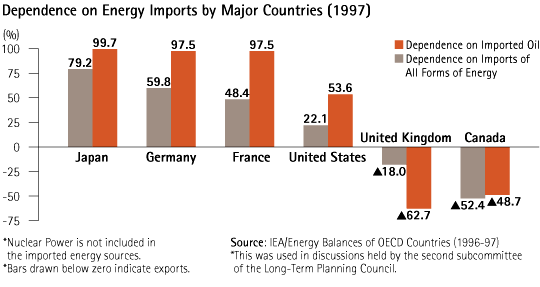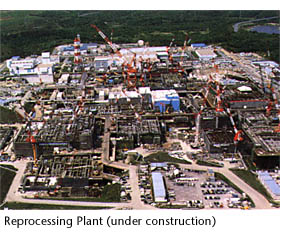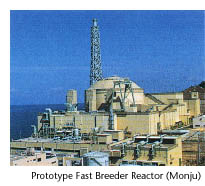Electric power generation
As an island country, it is impossible for Japan to exchange
energy with neighboring countries through power transmission lines
or pipelines. Japan is also energy-scarce, depending almost entirely
on foreign countries for its energy resources. These conditions
are completely different from those of Europe or the U.S.; therefore,
the Long-Term Program concludes that it is rational to continue
making the fullest possible use of nuclear power generation as
one of the mainstays of the nation's energy supply. Nuclear power
generation contributes to improved energy sufficiency and to the
stability of the energy supply, in addition to playing an important
role in reducing Japan's carbon dioxide emissions.

Utilization of plutonium
Japan's national policy opposes the possession of nuclear weapons:
this country has promoted the development and utilization of nuclear
power only for peaceful purposes. It is our goal to reprocess
spent fuel and utilize the by-products, plutonium and uranium,
for energy use. Regarding the reuse of plutonium, the Program
urges complete transparency in the utilization process to attest
to the principle that has been with us from the beginning: that
there be no possession of surplus plutonium.
 The
recovered plutonium will be used in existing light water reactors
in the process of MOX fuel utilization, and in research and development
on, for example, fast breeder reactor technology. Electric utilities
are beginning the commercial use of the light water reactors,
which use the MOX fuel, and plan to gradually increase the number
of them from 16 to 18 in total by the year 2010. The
recovered plutonium will be used in existing light water reactors
in the process of MOX fuel utilization, and in research and development
on, for example, fast breeder reactor technology. Electric utilities
are beginning the commercial use of the light water reactors,
which use the MOX fuel, and plan to gradually increase the number
of them from 16 to 18 in total by the year 2010.
Fast-breeder reactor (FBR)
 The
Long-Term Program points out that it is essential for Japan to
develop resource-saving energy technologies as a step toward a
long-term stable energy supply and to secure technological options
in a bid to solve future energy problems. The Program also states
that arrangements will be made to develop the Monju FBR facility
and its auxiliary facilities into an international cooperation
base, open to researchers from Japan and abroad, with the results
of their research and development efforts to be shared internationally. The
Long-Term Program points out that it is essential for Japan to
develop resource-saving energy technologies as a step toward a
long-term stable energy supply and to secure technological options
in a bid to solve future energy problems. The Program also states
that arrangements will be made to develop the Monju FBR facility
and its auxiliary facilities into an international cooperation
base, open to researchers from Japan and abroad, with the results
of their research and development efforts to be shared internationally.
Chairman Hiroji Ota of the Federation of Electric Power Companies
had high praise for this latest Long-Term Program, noting that
it provides "a fundamental philosophy and guidelines in the twenty-first
century." He noted that the Program is impressive in that it not
only reflects the opinions of nuclear experts, but those of the
public at large; in addition, the process by which it was devised
was highly transparent. Mr. Ota concluded, "We must continue to
pursue the flexible and forward-looking development and utilization
of nuclear power."
|